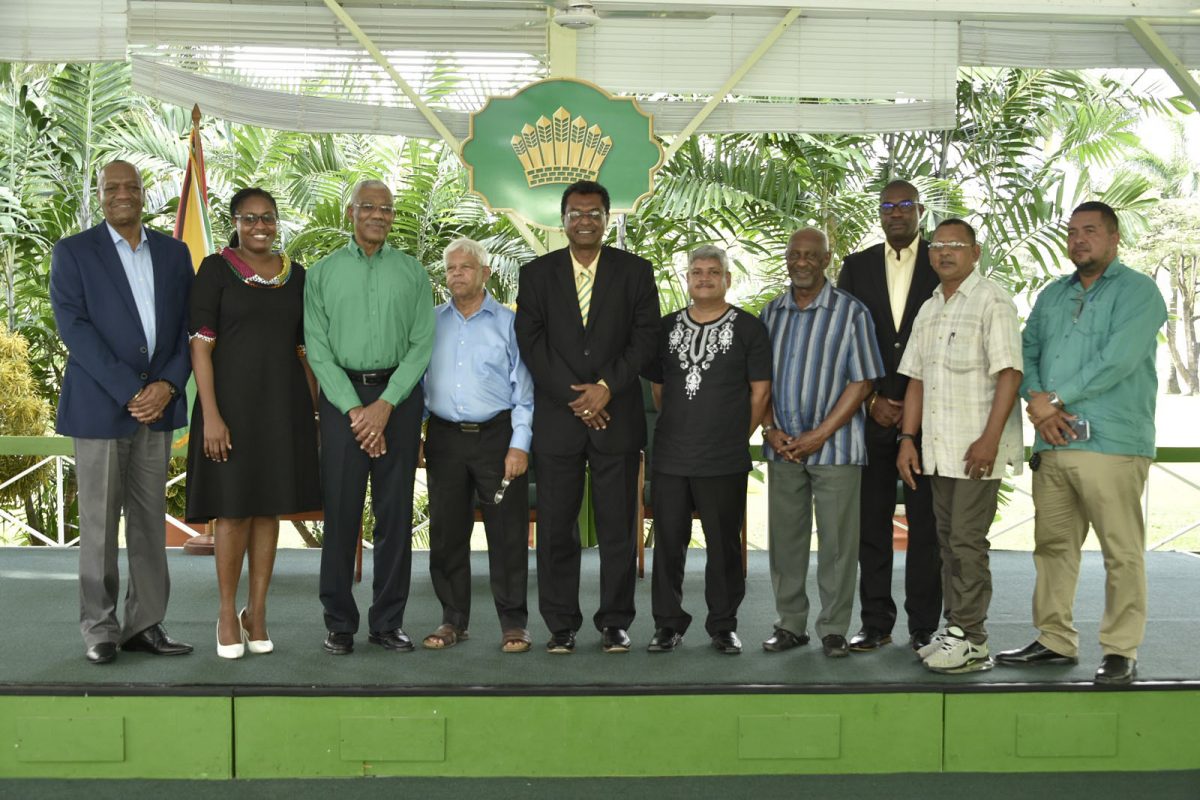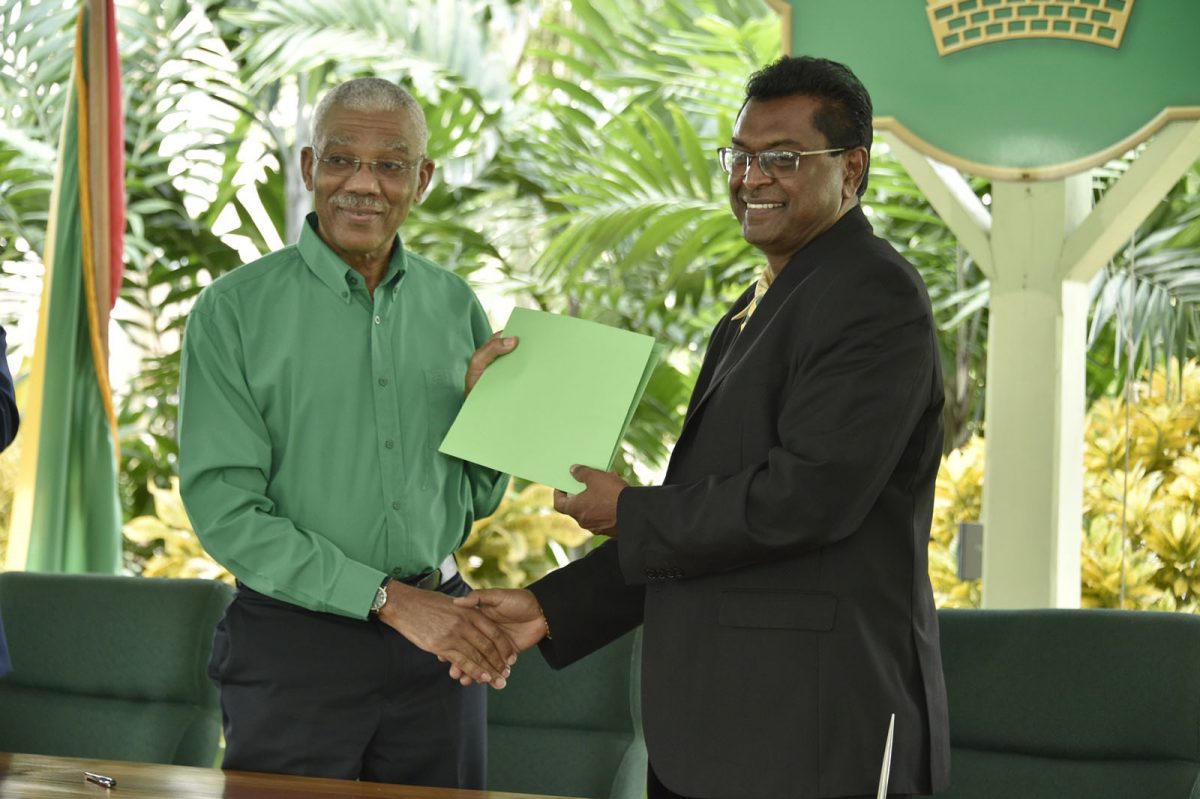Governing coalition partners A Partnership for National Unity (APNU) and the Alliance For Chance (AFC) yesterday inked an updated agreement for a unified slate to contest the March 2nd, 2020 general and regional elections.
The “Revised Cummingsburg Accord” was signed at State House by President David Granger, who is Chairman of APNU and Public Securities Minister Khemraj Ramjattan, who is the leader of the AFC, with APNU General Secretary Joseph Harmon and AFC General Secretary David Patterson signing as witnesses to the agreement.
The signing was first made public on the AFC’s Facebook page yesterday afternoon. The media was not invited to the signing, which was officially announced after the fact by way of a joint APNU+AFC statement.
The joint statement reported Granger as saying that the Cummingsburg Accord was strengthened based on experiences garnered over the last four and a half years. He was also reported as saying that the coalition parties had worked well together and the Revised Accord would lay the foundation for a more enhanced quality of governance for all the people of Guyana. Ramjattan, the statement added, said the parties that make up the coalition were “better together” and congratulated the negotiating team that worked to fashion the revised accord.

No details of the revised agreement were released but the AFC last month confirmed that there would be a 30:70 ratio in favour of APNU in the allocation of parliamentary seats, while Ramjattan would be designed the prime ministerial candidate on the joint slate. The split was 40:60 under the previous agreement for the 2015 polls, where the coalition unseated the PPP/C after 23 years in office, albeit by a slim margin of votes.
When contacted, Harmon explained that the coalition would release a document containing the central elements of the agreement “in a few days.” He explained that the official name for the agreement is the Revised Cummingsburg Accord, as it retains some of the features of the old accord, while featuring changes which he said are informed by experiences with, and interpretations of the Constitution, as well as missteps experienced during the current term.
Harmon did not specify what the experiences, interpretations, and missteps were.
Harmon said that in agreeing on the terms of the Revised Accord, the two parties “focused on governance and on constitutional reform, which are going to feature in a significant way in this accord, and it has been given prominence in terms of what we will do.” Constitutional reform, Harmon explained, will remain the responsibility of the Office of the Prime Minister, which office Harmon said will be strengthened, although he did not say in what way.
The Office of the Prime Minister has held the responsibility for constitutional reform since 2015. A Steering Committee on Constitutional Reform was commissioned, and, in 2016, submitted a report of its work, which included recommendations garnered through negotiations, and the last reform exercise to Prime Minister Moses Nagamootoo. The Prime Minister’s office also initiated initiatives meant to sensitise the public on areas believed to be appropriate for revision, however, the actual reform process has been stalled.
Meanwhile, Patterson shared with Stabroek News that the last of the issues which plagued the agreement and stymied its conclusion were ironed out during a meeting between the parties’ leaders last Friday. He said the Revised Accord will see a 70:30 ratio in terms in terms of the distribution of power among the parties.
Patterson clarified yesterday that this division pertains to all aspects of governance, including seats in the National Assembly and at the level of Regional Democratic Councils.
The key features of the initial accord were that the AFC would have the prime ministerial position in the government and 12 seats in Parliament, but a source has said that under the new agreement the AFC would hold fewer seats and its designated prime ministerial candidate, Ramjattan, will not become the president were that position to become vacant.
Patterson said both he and the AFC were happy with the outcome of the negotiations, and the resulting agreement.
The reduced concessions to the AFC under the revised agreement is seen as a reflection of the belief that the party has lost support, particularly in light of its poor showing at the 2018 local government polls. The defection of an AFC member, Charrandass Persaud, resulting in the passage of a no-confidence vote against government in the House last year, is also believed to have influenced the negotiations.
The joint APNU+AFC statement yesterday said representatives of APNU’s constituent parties—the People’s National Congress Reform (PNCR), which is APNU’s largest member, the Guyana Action Party (GAP), the National Front Alliance (NFA), the Working People’s Alliance (WPA), and the Justice for all Party (JFA)—attended the signing ceremony. GAP was represented by Errol Ross, the NFA by Keith Scott, the WPA by Tabitha Sarabo-Halley, and the JFA by CN Sharma and Jaipaul Sharma.
Chairman of APNU, President David Granger (left) and Leader of the AFC Khemraj Ramjattan shaking hands on the revised accord. (APNU photo)









